Good news! You just heard from an editor who will be happy to accept the story you sent…except for the Bad News, which is the acceptance is contingent on your agreeing to some changes in the manuscript. The question is: will you accept the changes or not?
The decision is personal, and different in every case. It depends on how you weigh many factors, including the following. These are not listed in any priority order:
- How desperate are you to make the sale? Early in your writing career, the degree of desperation might be greater.
- How likely is the story to be accepted elsewhere? You can measure this, to some extent, by the number of rejections the story has garnered so far.
- To what degree do you find the changes acceptable? I advise you to take a little time to determine this, since there’s an initial negative reaction to suggested alterations. Sometimes the editor’s ideas start to sound better after a few days.
- How extensive and explicit are the recommended revisions? This is a measure of the amount of work you’re going to have to do before you can resubmit. By ‘explicit’ I mean whether the changes are the change-this-word-to-that variety or the ‘make the tone lighter’ variety.
- How much would the changes affect a significant aspect of the story? You might have poured sweat and soul into this tale and now the editor proposes cutting a section packed with important symbolism and deep meaning. That scene is the heart of the story! In effect, the editor is suggesting you turn your story into something else.
- How much is this particular market paying? Yeah, let’s admit it–that’s a factor. If it’s a pro market, you’re much more likely to accept any changes.
You ought to give editors some credit and at least consider the changes they propose. They may not know your particular story as well as you do, but they read a lot and, in general, have a good sense of what works in today’s marketplace.
 Often the editor’s suggested changes are negotiable. You might accept some, but hold the line on others. When doing this, state your case about why you think your version is better (without belittling the editor, of course!). The editor may still disagree, and then you’ll have another decision to make. When you get as well-known as John Champlin Gardner, then you can negotiate as he did when an editor told him his novel The Sunlight Dialogues was too long and needed to be cut by one third. Gardner is said to have asked, “Which third?”
Often the editor’s suggested changes are negotiable. You might accept some, but hold the line on others. When doing this, state your case about why you think your version is better (without belittling the editor, of course!). The editor may still disagree, and then you’ll have another decision to make. When you get as well-known as John Champlin Gardner, then you can negotiate as he did when an editor told him his novel The Sunlight Dialogues was too long and needed to be cut by one third. Gardner is said to have asked, “Which third?”
Let’s say you aren’t crazy about the editor’s ideas, but you are anxious to make the sale, so you decide to agree to the changes. I recommend you keep your original version saved. Later, when your rights to the story revert back to you, you can market that original version and perhaps get it published. In that reprint version, you’ll need to cite the earlier publication with a statement such as, “Previously published in a different form in <market> in <year>.”
Ultimately it is your decision whether to make the suggested revisions. After all, it is your good name that goes on the story. If you feel very strongly, then don’t alter a line; keep on sending the manuscript to other markets. Your story may find an editor who likes it as is. These days, you can also publish the story without getting it accepted by an editor at all.
Leave a comment and let me know what your experience has been in this situation. Did you make the change, negotiate, or refuse and submit elsewhere? What were the reasons for your choice? Did you regret it later? Always willing to at least consider an editor’s suggestions, I’m–
Poseidon’s Scribe
